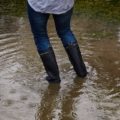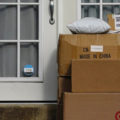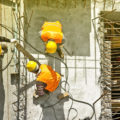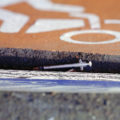Research revealed that plastic shields or “face shields” are basically useless for trapping respiratory aerosols. This calls into question their effectiveness in preventing the spread of coronavirus, according to elnacional
MiamiDiario Editorial Staff
The Riken Research Institute, in Japan, made a simulation with Fugaku, the fastest supercomputer in the world. In the test, it was detected that almost 100% of the drops in the air of less than 5 micrometers in size escaped through these scopes. In addition, it detected that half of the largest drops measuring 50 micrometers found their way back into the air.
In that sense, Makoto Tsubokura, team leader of the Riken Computer Science Center, gave details of the work. He said the simulation combined airflow with the reproduction of tens of thousands of drops of different sizes. These ranged from less than 1 micrometer to several hundred micrometers.
The scientist warned about the use of facial shields as an alternative. “Judging by the research results, unfortunately the effectiveness of face shields in preventing droplets from spreading from the mouth of an infected person is limited compared to masks,” reports The Guardian.
This becomes more evident for drops of less than 20 microns. It also ensured that all the much smaller aerosol particles escaped through the space between the face and the face shield.
Tsubokura advised people with respiratory problems or young children to use them in open spaces or in ventilated enclosures. The same computer also tested masks, concluding that those made of nonwoven fabric are more effective than those made of cotton and polyester in blocking the spread of the virus through airborne droplets.
With information from elnacional
Translated by: Aleuzenev Nogales
You may also be interested in:
How does internal ventilation affect the spread of coronavirus
Facebook removed accounts that sought to influence public opinion in Latin America
Good news! New life saving symptom of covid discovered at University of Miami
Más sobre este tema
- Leche materna protege contra el Covid-19, según estudio
- FDA aprueba vacuna contra variantes del Covid-19: ¿Cuándo estará disponible?
- ¿Brazo izquierdo o derecho? Estudio revela la mejor opción para aplicar refuerzo contra Covid-19
- Aumentan casos de Covid-19 en EE.UU. ¿Cómo prevenir el contagio?
- Viróloga que huyó de China reveló que propagación del Covid-19 fue intencional

















